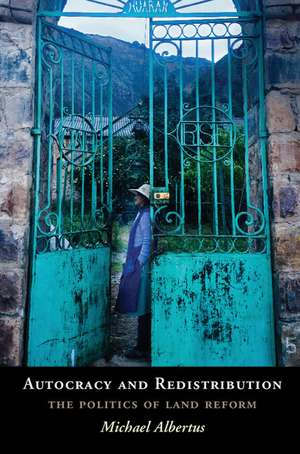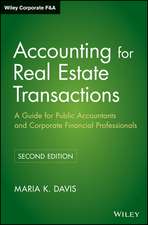Autocracy and Redistribution: The Politics of Land Reform: Cambridge Studies in Comparative Politics
Autor Michael Albertusen Limba Engleză Paperback – 14 sep 2015
| Toate formatele și edițiile | Preț | Express |
|---|---|---|
| Paperback (1) | 241.24 lei 6-8 săpt. | |
| Cambridge University Press – 14 sep 2015 | 241.24 lei 6-8 săpt. | |
| Hardback (1) | 702.10 lei 6-8 săpt. | |
| Cambridge University Press – 14 sep 2015 | 702.10 lei 6-8 săpt. |
Din seria Cambridge Studies in Comparative Politics
-
 Preț: 179.15 lei
Preț: 179.15 lei -
 Preț: 267.61 lei
Preț: 267.61 lei -
 Preț: 239.36 lei
Preț: 239.36 lei - 9%
 Preț: 594.67 lei
Preț: 594.67 lei -
 Preț: 160.82 lei
Preț: 160.82 lei -
 Preț: 269.58 lei
Preț: 269.58 lei -
 Preț: 264.74 lei
Preț: 264.74 lei -
 Preț: 177.28 lei
Preț: 177.28 lei -
 Preț: 225.70 lei
Preț: 225.70 lei -
 Preț: 164.94 lei
Preț: 164.94 lei -
 Preț: 236.42 lei
Preț: 236.42 lei -
 Preț: 185.64 lei
Preț: 185.64 lei -
 Preț: 233.13 lei
Preț: 233.13 lei -
 Preț: 206.71 lei
Preț: 206.71 lei -
 Preț: 231.82 lei
Preț: 231.82 lei -
 Preț: 206.52 lei
Preț: 206.52 lei -
 Preț: 201.24 lei
Preț: 201.24 lei -
 Preț: 358.37 lei
Preț: 358.37 lei -
 Preț: 203.42 lei
Preț: 203.42 lei -
 Preț: 232.45 lei
Preț: 232.45 lei -
 Preț: 257.82 lei
Preț: 257.82 lei -
 Preț: 191.12 lei
Preț: 191.12 lei -
 Preț: 158.77 lei
Preț: 158.77 lei -
 Preț: 199.05 lei
Preț: 199.05 lei - 11%
 Preț: 553.80 lei
Preț: 553.80 lei - 11%
 Preț: 695.06 lei
Preț: 695.06 lei -
 Preț: 288.80 lei
Preț: 288.80 lei -
 Preț: 262.06 lei
Preț: 262.06 lei - 11%
 Preț: 691.66 lei
Preț: 691.66 lei -
 Preț: 388.29 lei
Preț: 388.29 lei -
 Preț: 288.04 lei
Preț: 288.04 lei -
 Preț: 228.00 lei
Preț: 228.00 lei -
 Preț: 385.28 lei
Preț: 385.28 lei -
 Preț: 312.89 lei
Preț: 312.89 lei -
 Preț: 224.44 lei
Preț: 224.44 lei -
 Preț: 287.07 lei
Preț: 287.07 lei -
 Preț: 251.27 lei
Preț: 251.27 lei -
 Preț: 313.70 lei
Preț: 313.70 lei -
 Preț: 277.38 lei
Preț: 277.38 lei -
 Preț: 423.79 lei
Preț: 423.79 lei - 11%
 Preț: 552.94 lei
Preț: 552.94 lei - 11%
 Preț: 554.43 lei
Preț: 554.43 lei - 14%
 Preț: 783.26 lei
Preț: 783.26 lei
Preț: 241.24 lei
Nou
Puncte Express: 362
Preț estimativ în valută:
46.17€ • 48.02$ • 38.64£
46.17€ • 48.02$ • 38.64£
Carte tipărită la comandă
Livrare economică 15-29 martie
Preluare comenzi: 021 569.72.76
Specificații
ISBN-13: 9781107514300
ISBN-10: 1107514304
Pagini: 370
Ilustrații: 43 b/w illus.
Dimensiuni: 153 x 230 x 21 mm
Greutate: 0.51 kg
Editura: Cambridge University Press
Colecția Cambridge University Press
Seria Cambridge Studies in Comparative Politics
Locul publicării:New York, United States
ISBN-10: 1107514304
Pagini: 370
Ilustrații: 43 b/w illus.
Dimensiuni: 153 x 230 x 21 mm
Greutate: 0.51 kg
Editura: Cambridge University Press
Colecția Cambridge University Press
Seria Cambridge Studies in Comparative Politics
Locul publicării:New York, United States
Cuprins
1. Introduction; 2. Actors, interests, and the origins of elite splits; 3. A theory of land reform; 4. Measuring land reform; 5. A cross-national analysis of land reform in Latin America; 6. Elite splits and land redistribution under autocracy: Peru's 'revolution from above'; 7. Land reform transformed to redistribution: Venezuela's Punto Fijo democracy and Chávez's Bolivarian revolution; 8. Latin America in comparative perspective; 9. Conclusion.
Recenzii
'This book is an exceptional achievement. It combines theoretical and methodological sophistication with empirical richness. Albertus demonstrates that land redistribution is more likely under dictatorship than democracy and builds a persuasive argument about why that is the case. The book is an outstanding contribution to the literatures on land redistribution, democracies and dictatorships, political economy, and Latin American politics.' Scott Mainwaring, Eugene and Helen Conley Professor of Political Science, University of Notre Dame
'Albertus' book is a must-read for understanding distributive politics in Latin America and beyond. Albertus provides a crucial contribution to the discipline by focusing on the political incentives leading to redistribution under different types of political regime. Based on an impressive study of land reforms, he provides a novel theory for understanding land redistribution and the different conditions that led to land renegotiation and colonization. This shift to the incentives of elites and their institutional possibilities provides a crucial contribution to the literature on democracy and redistribution. He finds support for his theory using an impressive dataset of cross-national evidence combined with in-depth longitudinal analyses of Peru and Venezuela. Without doubt, this book will become a reference in comparative studies of development and distributive politics more generally.' M. Victoria Murillo, Columbia University
'In this important book Albertus provides new answers to a range of questions about land reform. When does meaningful land reform take place? Why are some reform programs more efficient than others? Albertus' answers - for example, that land reform is more likely under authoritarian regimes than under democratic ones - challenge the conventional wisdom. This book will be of interest to comparative scholars as well students of economic development.' Barry R. Weingast, Ward C. Krebs Family Professor, Stanford University
'A great paradox of modern political life is that concentrated landed wealth is a great frozen ice cap blocking the emergence of modern democracy and development. Yet, democracies themselves seem less capable of implementing land reform than autocracies. To date we have only the barest understanding of the complex politics of land reform. In this careful and ambitious study, Michael Albertus untangles these puzzles, constructing the most comprehensive cross-national and historical dataset on land reform alongside carefully crafted case studies of Peru and Venezuela. The result is an argument that provides the most compelling political theory of land reform to date that has broad implications for the study of democracy, redistribution and autocracy.' Daniel Ziblatt, Harvard University, Massachusetts
'Albertus' book is a must-read for understanding distributive politics in Latin America and beyond. Albertus provides a crucial contribution to the discipline by focusing on the political incentives leading to redistribution under different types of political regime. Based on an impressive study of land reforms, he provides a novel theory for understanding land redistribution and the different conditions that led to land renegotiation and colonization. This shift to the incentives of elites and their institutional possibilities provides a crucial contribution to the literature on democracy and redistribution. He finds support for his theory using an impressive dataset of cross-national evidence combined with in-depth longitudinal analyses of Peru and Venezuela. Without doubt, this book will become a reference in comparative studies of development and distributive politics more generally.' M. Victoria Murillo, Columbia University
'In this important book Albertus provides new answers to a range of questions about land reform. When does meaningful land reform take place? Why are some reform programs more efficient than others? Albertus' answers - for example, that land reform is more likely under authoritarian regimes than under democratic ones - challenge the conventional wisdom. This book will be of interest to comparative scholars as well students of economic development.' Barry R. Weingast, Ward C. Krebs Family Professor, Stanford University
'A great paradox of modern political life is that concentrated landed wealth is a great frozen ice cap blocking the emergence of modern democracy and development. Yet, democracies themselves seem less capable of implementing land reform than autocracies. To date we have only the barest understanding of the complex politics of land reform. In this careful and ambitious study, Michael Albertus untangles these puzzles, constructing the most comprehensive cross-national and historical dataset on land reform alongside carefully crafted case studies of Peru and Venezuela. The result is an argument that provides the most compelling political theory of land reform to date that has broad implications for the study of democracy, redistribution and autocracy.' Daniel Ziblatt, Harvard University, Massachusetts
Notă biografică
Descriere
This book provides a novel theory of land reform and tests it using extensive original data dating back to 1900.











